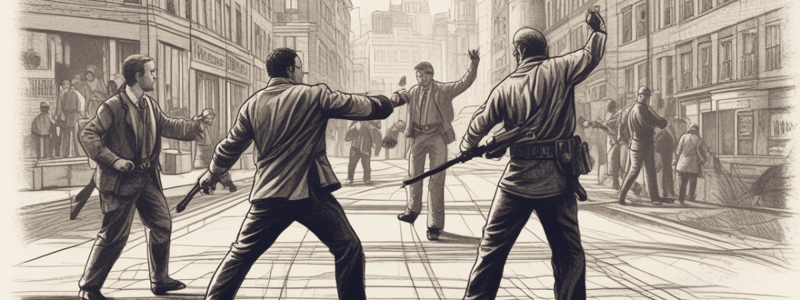Podcast
Questions and Answers
Under what circumstances is the use of deadly force justified?
Under what circumstances is the use of deadly force justified?
- When the person is attempting to commit a forcible felony
- When the person is in a public place
- When the actor is the initial aggressor
- When the person reasonably believes the force is necessary to protect themselves or others from death or serious physical injury (correct)
What is a requirement for the legal use of non-deadly force in self-defense or the defense of other persons?
What is a requirement for the legal use of non-deadly force in self-defense or the defense of other persons?
- The person reasonably believes the force is necessary to defend themselves or a third person (correct)
- The person must be in a public place
- The person must be the initial aggressor
- The person must have withdrawn from the encounter
When is the use of physical restraint as protective force justified?
When is the use of physical restraint as protective force justified?
- When the person is the initial aggressor
- When the person reasonably believes the restraint is necessary to protect themselves or others (correct)
- When the person is in a public place
- When the person is attempting to commit a crime
What is not a requirement for the legal use of deadly force?
What is not a requirement for the legal use of deadly force?
When does a person have a duty to retreat?
When does a person have a duty to retreat?
What is an exception to the justification for the use of physical force?
What is an exception to the justification for the use of physical force?
What is a circumstance under which the use of deadly force is justified?
What is a circumstance under which the use of deadly force is justified?
What is a requirement for the legal use of non-deadly force in self-defense or the defense of other persons?
What is a requirement for the legal use of non-deadly force in self-defense or the defense of other persons?
When is the use of physical force justified?
When is the use of physical force justified?
What is an exception to the duty to retreat?
What is an exception to the duty to retreat?
What is the primary objective of the Justification — Use of Force block of instruction?
What is the primary objective of the Justification — Use of Force block of instruction?
What is the requirement for the legal use of deadly force in self-defense or the defense of other persons?
What is the requirement for the legal use of deadly force in self-defense or the defense of other persons?
What is the Supreme Court ruling (Tennessee vs. Garner, 3/27/85) regarding the use of deadly force against a fleeing felon?
What is the Supreme Court ruling (Tennessee vs. Garner, 3/27/85) regarding the use of deadly force against a fleeing felon?
What is the power of arrest jurisdictionally for a law enforcement officer?
What is the power of arrest jurisdictionally for a law enforcement officer?
When can a private person be justified in using deadly and non-deadly force in making an arrest?
When can a private person be justified in using deadly and non-deadly force in making an arrest?
What is the effect of a department adopting a more restrictive policy on the use of force than state law specifies?
What is the effect of a department adopting a more restrictive policy on the use of force than state law specifies?
What is the relationship between civil liability and the criminal code?
What is the relationship between civil liability and the criminal code?
What is the purpose of a department's policy regarding the use of deadly and non-deadly force?
What is the purpose of a department's policy regarding the use of deadly and non-deadly force?
Who has the burden of injecting the issue of justification under this section when a defendant asserts that their use of force is necessary to defend against unlawful force?
Who has the burden of injecting the issue of justification under this section when a defendant asserts that their use of force is necessary to defend against unlawful force?
Under what circumstances may a person use deadly force in defense of property?
Under what circumstances may a person use deadly force in defense of property?
What is the requirement for the legal use of physical force in defense of property?
What is the requirement for the legal use of physical force in defense of property?
When may a law enforcement officer use physical force to effect an arrest?
When may a law enforcement officer use physical force to effect an arrest?
What is the limitation on the use of physical force by a law enforcement officer when making an arrest?
What is the limitation on the use of physical force by a law enforcement officer when making an arrest?
In what circumstances may a law enforcement officer use deadly force when making an arrest?
In what circumstances may a law enforcement officer use deadly force when making an arrest?
What is the Supreme Court ruling in Tennessee vs. Garner (3/27/85) regarding the use of deadly force against a fleeing felon?
What is the Supreme Court ruling in Tennessee vs. Garner (3/27/85) regarding the use of deadly force against a fleeing felon?
When is the use of physical restraint justified in defense of property?
When is the use of physical restraint justified in defense of property?
What is the requirement for the legal use of deadly force in defense of property?
What is the requirement for the legal use of deadly force in defense of property?
What is the limitation on the use of physical force by a law enforcement officer when making an arrest?
What is the limitation on the use of physical force by a law enforcement officer when making an arrest?
When is a law enforcement officer justified in using deadly force?
When is a law enforcement officer justified in using deadly force?
Under what circumstances can a private person use physical force to assist a law enforcement officer?
Under what circumstances can a private person use physical force to assist a law enforcement officer?
What is the primary consideration for a law enforcement officer when determining the amount of physical force to use in making an arrest?
What is the primary consideration for a law enforcement officer when determining the amount of physical force to use in making an arrest?
When is a law enforcement officer exempt from the statute regarding the use of physical force?
When is a law enforcement officer exempt from the statute regarding the use of physical force?
What is a necessary condition for a law enforcement officer to use physical force in making an arrest?
What is a necessary condition for a law enforcement officer to use physical force in making an arrest?
When can a law enforcement officer use deadly force under the US Supreme Court ruling in Tennessee vs. Garner?
When can a law enforcement officer use deadly force under the US Supreme Court ruling in Tennessee vs. Garner?
Who is exempt from the statute regarding the use of physical force in making an arrest?
Who is exempt from the statute regarding the use of physical force in making an arrest?
What is the primary consideration for a law enforcement officer when determining whether to use deadly force?
What is the primary consideration for a law enforcement officer when determining whether to use deadly force?
When can a private person use deadly force in making an arrest?
When can a private person use deadly force in making an arrest?
What is a limitation on a private person's use of physical force in making an arrest?
What is a limitation on a private person's use of physical force in making an arrest?
What is the primary condition that must be met for a private person to use physical force to arrest or prevent the escape of an offender?
What is the primary condition that must be met for a private person to use physical force to arrest or prevent the escape of an offender?
When can a private person use deadly force to arrest or prevent the escape of an offender?
When can a private person use deadly force to arrest or prevent the escape of an offender?
Under what circumstances can a guard or law enforcement officer use physical force to prevent escape from confinement?
Under what circumstances can a guard or law enforcement officer use physical force to prevent escape from confinement?
What is the effect of a department adopting a more restrictive policy on the use of force than state law specifies?
What is the effect of a department adopting a more restrictive policy on the use of force than state law specifies?
What is the relationship between the criminal code and civil liability?
What is the relationship between the criminal code and civil liability?
What is the purpose of a department's policy regarding the use of deadly and non-deadly force?
What is the purpose of a department's policy regarding the use of deadly and non-deadly force?
In what type of scenario is the appropriate reaction to the situation and the appropriate amount of force to be used in response to the perceived threat typically evaluated?
In what type of scenario is the appropriate reaction to the situation and the appropriate amount of force to be used in response to the perceived threat typically evaluated?
What is the primary consideration when determining whether to use physical force to arrest or prevent the escape of an offender?
What is the primary consideration when determining whether to use physical force to arrest or prevent the escape of an offender?
What is the relationship between the use of deadly force and the risk of human life or serious physical injury?
What is the relationship between the use of deadly force and the risk of human life or serious physical injury?
What is the purpose of evaluating the justification for using physical force to arrest or prevent the escape of an offender?
What is the purpose of evaluating the justification for using physical force to arrest or prevent the escape of an offender?
Flashcards are hidden until you start studying
Study Notes
Justification and Use of Force
- The justification for the use of force is based on the Missouri Criminal Code
- There are two types of force: deadly force and non-deadly force
Use of Non-Deadly Force
- Justifiable when necessary to:
- Defend oneself or others from imminent harm
- Prevent the commission or attempted commission of a crime
- Effect an arrest or prevent escape from custody
- Not justifiable when:
- The actor was the initial aggressor
- The actor was attempting to commit a forcible felony
- The actor was not in a place where he or she had a right to be
Use of Deadly Force
- Justifiable when necessary to:
- Protect oneself or others from death, serious physical injury, or any forcible felony
- Prevent an escape from custody when the person to be arrested has committed or attempted to commit a felony involving serious physical injury
- Prevent an escape from custody when the person to be arrested is attempting to escape by use of a deadly weapon or dangerous instrument
- Not justifiable when:
- The use of deadly force is not necessary to prevent death or serious physical injury
- The use of deadly force is not necessary to prevent an escape from custody
Use of Force in Defense of Premises
- A person does not have a duty to retreat from:
- A dwelling, residence, or vehicle where the person is not unlawfully entering or remaining
- Private property that is owned or leased by the person
- Any other location where the person has the right to be
- The justification for the use of force in defense of premises extends to the use of physical restraint as protective force
Use of Force in Defense of Property
- Justifiable when necessary to:
- Prevent the commission or attempted commission of a crime
- Prevent the escape from custody of a person who has committed a crime
- Not justifiable when:
- The use of force is not necessary to prevent the commission or attempted commission of a crime
- The use of force is not necessary to prevent an escape from custody
Use of Force by Law Enforcement Officers
- Law enforcement officers may use force to:
- Effect an arrest or prevent an escape from custody
- Defend themselves or others from imminent harm
- Law enforcement officers may use deadly force only:
- When authorized under other sections of the Missouri Criminal Code
- When necessary to prevent death or serious physical injury to the officer or others
- When necessary to prevent an escape from custody when the person to be arrested has committed or attempted to commit a felony involving serious physical injury
Supreme Court Ruling on Deadly Force
- Tennessee vs. Garner (1985) held that deadly force may be used against a fleeing felon only when:
- The officer has probable cause to believe that the suspect poses a significant threat of death or serious injury to the officer or others
- The officer gives a warning to the suspect, if feasible
- The officer has probable cause to believe that the suspect has committed a felony involving serious physical injury
Private Persons and Use of Force
- Private persons may use force to:
- Assist a law enforcement officer in making an arrest or preventing an escape from custody
- Arrest or prevent the escape of a person who has committed a crime
- Private persons may use deadly force only:
- When authorized under other sections of the Missouri Criminal Code
- When directed or authorized by a law enforcement officer to use deadly force
- When necessary to prevent death or serious physical injury to the officer or others
Civil Liability and Departmental Policy
- The justification for the use of force provided by the criminal code applies only to criminal liability
- Civil liability and civil remedies are unaffected by the criminal code
- Departmental policies on the use of force may be more restrictive than state law
- Officers must conform to the more restrictive departmental policy
Role-Play Scenarios
- Trainees will participate in role-play scenarios to demonstrate an understanding of the appropriate use of force in various situations
- Scenarios will include situations involving the use of non-deadly and deadly force
- Trainees will be asked to analyze the situation, describe an appropriate response, and determine the appropriate amount of force to use in response to the perceived threat
Studying That Suits You
Use AI to generate personalized quizzes and flashcards to suit your learning preferences.




